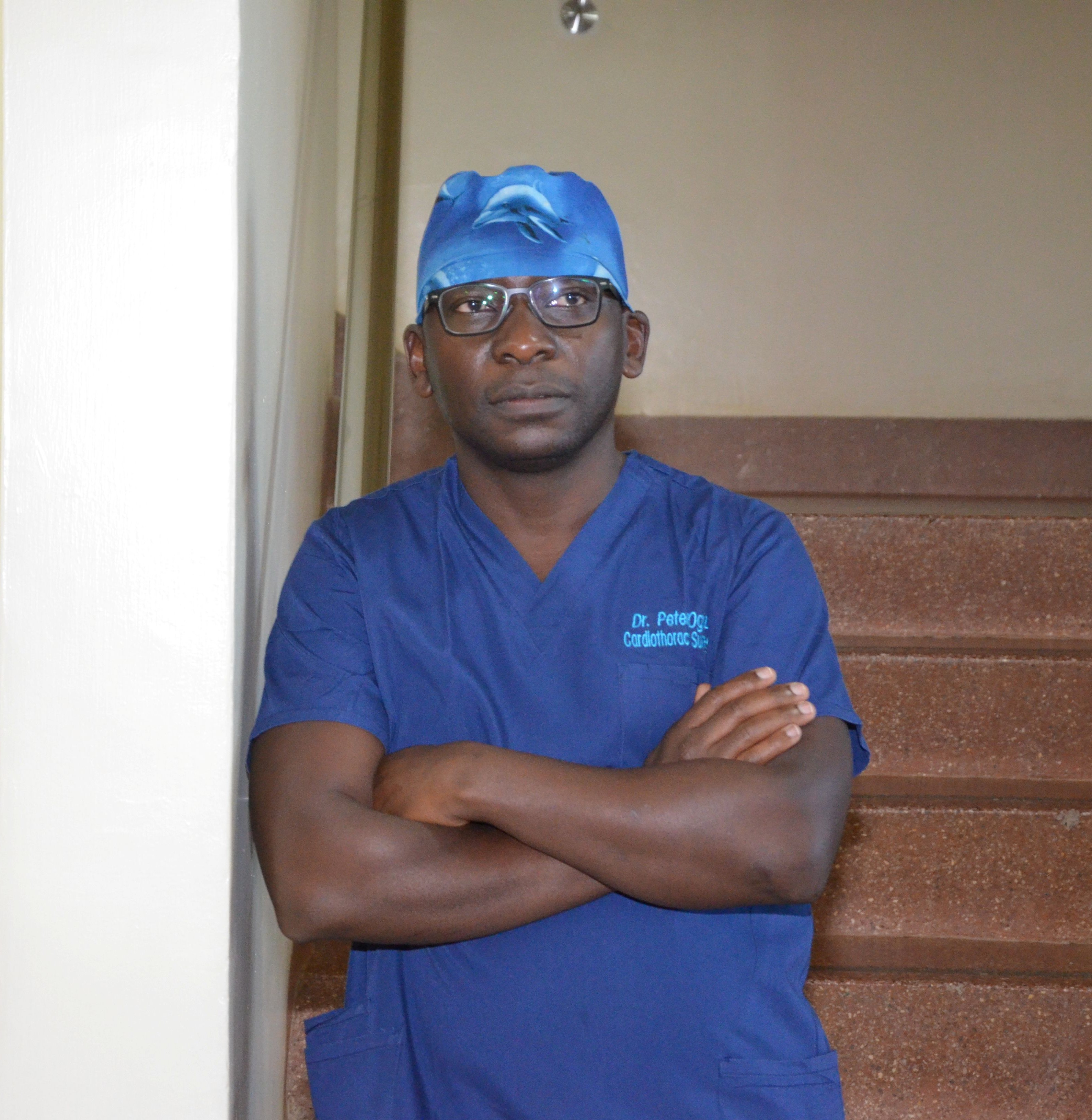 Dr Peter Ogutu, consultant cardiothoracic surgeon at Aga Khan University Hospital, Nairobi.
Dr Peter Ogutu, consultant cardiothoracic surgeon at Aga Khan University Hospital, Nairobi.
It all began with a sore throat, which culminated in
general body weakness. The situation made it difficult for Samuel Obare to continue
with his favourite sport, football, because of the racing heartbeat as he ran in
the field.
When Samuel was a child, football was his world,
a place where speed and stamina defined friendship and joy. As the boy from
Nyamira grew, he noted something was wrong. “The first signs I noticed were fever, joint
pains, coughing, general weakness and difficulty breathing,” Samuel recalls.
His heartbeat became abnormal while chasing a ball, an urgent whisper his body
sent that something was wrong.
Samuel was 22 years old when he was diagnosed with rheumatic
heart disease. The diagnosis threw his family into emotional turmoil. Neither he
nor his family were familiar with the disease. “At first, it was terrible,”
Samuel admits. Fear and uncertainty clouded their days, and the once vibrant
boy found himself sidelined from school sports and daily activities.
Dr Peter Ogutu, a cardiac surgeon
at Aga Khan University Hospital, explains that rheumatic heart disease is a consequence of untreated
streptococcal throat infections.
“The bacteria damage the heart valves, which then either
don’t open properly or close completely. This means the heart struggles to pump
blood efficiently,” he says. The result is fatigue, breathlessness and chest pain, symptoms
that tragically look like normal youthful exhaustion, making early diagnosis
difficult.
The disease primarily affects young people because rheumatic
fever, which is a precursor caused by untreated streptococcal throat infections, mainly
strikes children and adolescents. Dr Ogutu explains, “Infections are common in
low-resource settings where early antibiotics are often unavailable. This
untreated infection leads to inflammation that damages heart valves over time.”
Samuel’s daily routine changed abruptly. Simple walks to school proved difficult. Playing football became just a memory. “I would try playing, but would get tired quickly and stop,” he says. Schoolwork too suffered as fatigue crept in, stealing not just energy but participation in life’s ordinary moments.
His family struggled alongside him. Without clear knowledge
of the disease, they feared the worst and felt powerless. “I think if we had
known about rheumatic heart disease earlier, maybe things could have been
different,” Samuel reflects.
Samuel narrates that local hospitals in his home county and
nearby counties could not perform the complex surgeries Samuel required. His
journey took him to several hospitals before he finally landed at Nairobi’s Aga
Khan University Hospital, where Dr Ogutu manages complicated adult cases.
Dr Ogutu explains that diagnosis relies on clinical history, fatigue, chest pain, and breathlessness. They also confirm findings using echocardiograms
to assess heart valve damage. The earlier the detection, the more options exist
and the better the chance for a good outcome.
Treatment includes medication to manage symptoms and prevent
infections, but for many like Samuel, surgical intervention is inevitable. “In
Samuel’s case, valve repair was necessary. Surgery is a turning point, but
recovery involves lifelong monitoring,” Dr Ogutu stresses.
While surgery addresses the physical damage, the
psychological toll of living with rheumatic heart disease is enormous. Dr Ogutu emphasises counselling and family engagement.
“Patients can feel isolated or anxious about their future.
Support groups, church communities, and counselling help bridge those gaps,” he
says.
Samuel acknowledges this emotional battle. “The church was
my pillar of strength. They encouraged me when I felt like giving up. My
brother’s support during recovery was crucial.” This emotional network fueled
Samuel’s determination, encouraging him to celebrate small victories and
reclaim his life step by step.
Samuel’s experience echoes a systemic challenge. Families
may overlook sore throats or delay treatment due to a lack of awareness or access
to care. “Prevention is key,” Dr Ogutu says. “Communities should be educated on
recognising early symptoms and ensuring prompt treatment.”
Dr Ogutu advocates for community participation in health
education. He says that families need to recognise warning signs and seek
health services immediately. Schools and community centres can disseminate
vital information about sore throat management to prevent progression.
For newly diagnosed patients,Dr Ogutu offers hope anchored
in practical advice. “Stay informed, ask questions, adhere to medications and
maintain regular medical follow-up. Most importantly, don’t lose hope, many can
live fulfilling lives with proper care.”
Dr Ogutu’s vision for the future of rheumatic heart disease care in Kenya is optimistic. He says, “With improved awareness, early detection and advanced treatment options, we can reduce the burden of this disease drastically.”
He argues that research should focus on affordable diagnostic tools and
community-based prevention programmes.











